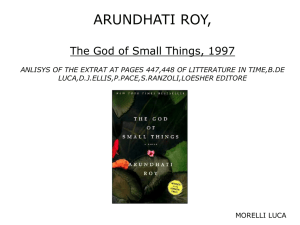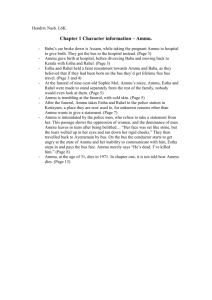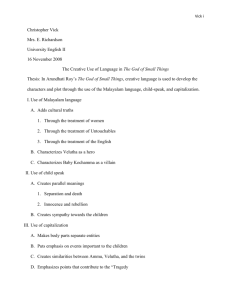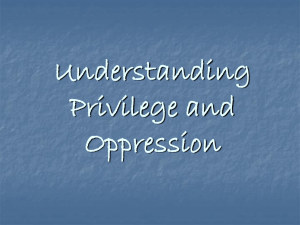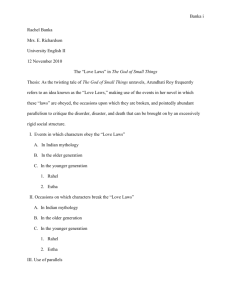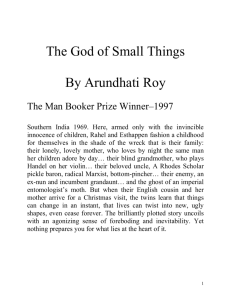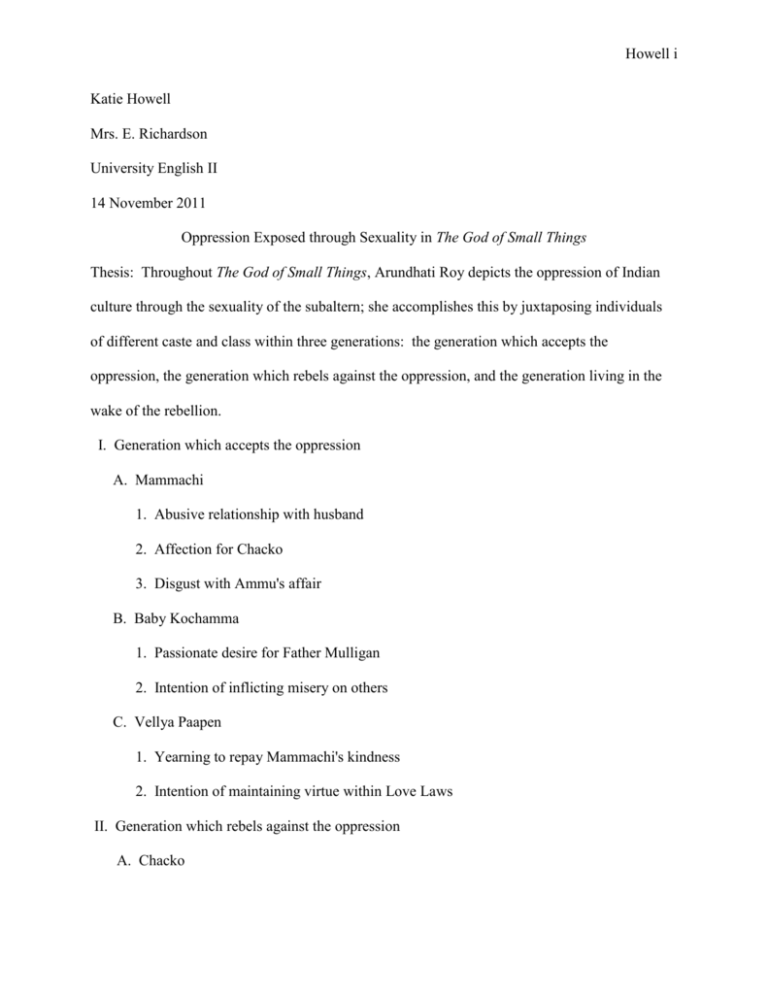
Howell i
Katie Howell
Mrs. E. Richardson
University English II
14 November 2011
Oppression Exposed through Sexuality in The God of Small Things
Thesis: Throughout The God of Small Things, Arundhati Roy depicts the oppression of Indian
culture through the sexuality of the subaltern; she accomplishes this by juxtaposing individuals
of different caste and class within three generations: the generation which accepts the
oppression, the generation which rebels against the oppression, and the generation living in the
wake of the rebellion.
I. Generation which accepts the oppression
A. Mammachi
1. Abusive relationship with husband
2. Affection for Chacko
3. Disgust with Ammu's affair
B. Baby Kochamma
1. Passionate desire for Father Mulligan
2. Intention of inflicting misery on others
C. Vellya Paapen
1. Yearning to repay Mammachi's kindness
2. Intention of maintaining virtue within Love Laws
II. Generation which rebels against the oppression
A. Chacko
Howell ii
1. Marriage to and divorce from Margaret Kochamma
2. Sexual relations with Paravan women
3. High regard by family members
B. Ammu
1. Divorce from abusive husband
2. Affair with Velutha
3. Scorn by family members
C. Velutha
1. Relationship with Estha and Rahel
2. Affair with Ammu
III. Generation living in the wake of the rebellion
A. Sophie Mol
1. Innocence in English childhood
2. Admiration bestowed by Ayemenem family
3. Accidental death
B. Estha
1. Innocence in childhood
2. Corruption involving man at theater
3. Life of perpetual fear
4. Incestuous relationship with Rahel
C. Rahel
1. Innocence in childhood
2. Corruption through tragic experiences
Howell iii
3. Marriage to Larry McCaslin
4. Incestuous relationship with Estha
Howell 1
Katie Howell
Mrs. E. Richardson
University English II
13 January 2012
Oppression Exposed through Sexuality in The God of Small Things
Arundhati Roy’s The God of Small Things is an electrifying novel centered on the
forbidden love affair between a Syrian Christian woman, Ammu, and a low-caste carpenter,
Velutha, in the Indian state of Kerala. Ammu and her fraternal twins, Estha and Rahel, live in
Ayemenem with Ammu’s brother Chaco, their mother Mammachi, and their aunt Baby
Kochamma. During a two-week visit to Ayemenem by Chaco’s ex-wife, Margaret Kochamma,
and daughter, Sophie Mol, life takes a devastating turn. Through a series of flashbacks and
foreshadowing, the novel unfolds in two basic time periods: the two weeks leading up to the
death of the twins’ first cousin, and twenty-three years later when Rahel returns to the house in
Ayemenem. Throughout The God of Small Things, Arundhati Roy depicts the oppression of
Indian culture through the sexuality of the subaltern1; she accomplishes this by juxtaposing
individuals of different caste and class within three generations: the generation which accepts
the oppression, the generation which rebels against the oppression, and the generation living in
the wake of the rebellion.
In The God of Small Things, the author exposes the oppression of Indian culture through
the sexuality of those individuals who accept the oppression. Mammachi, a member of this
generation, has grown to expect the exploitation of both women and “untouchables” typical
For the purposes of this paper, the term “subaltern” will be defined in the same context as it is used in O.P.
Dwivedi’s “The Subaltern and the Text: Reading Arundhati Roy’s The God of Small Things.” The term will refer
to “the general attitude of subordination in South Asian Society whether this is expressed in terms of class, caste,
age, gender and office or in any other way” (Dwivedi 388). Throughout this paper, however, the term “subaltern”
will primarily refer to two groups of individuals: women and the “untouchables.”
1
Howell 2
within Indian society. The wife of a former government official, Mammachi is familiar with the
general resentment from and regular beatings by her husband. Referring to Mammachi’s
husband, the narrator claims, “Every night he beat her with a brass flower vase. The beatings
weren’t new” (A. Roy 47). This illustration of physical abuse provides only a glimpse into the
patriarchy of Indian culture. Mammachi’s inferiority to her husband becomes clear when the
narrator states that “Pappachi would not help [Mammachi] with the pickle-making because he
did not consider pickle-making a suitable job for a high-ranking ex-Government official” (46).
Roy’s ironic juxtaposition of a slothful character, exerting energy only to beat his wife, serves to
further illustrate the patriarchy of Indian society. Consistent with the expectations of Indian
culture, moreover, Mammachi remains committed to her husband until his death and even cries
at his funeral – not necessarily because she loves him but because she has been committed to him
for so long. The narrator states, “At Pappachi’s funeral, Mammachi cried…. Ammu told the
twins that Mammachi was crying more because she was used to him than because she loved him.
She was used to having him slouching around the pickle factory, and was used to being beaten
from time to time” (49). Despite the frequent abuse of her husband, Mammachi understands her
role of wife as determined by her contemporaries and fulfills the expectations of the role.
In addition to Mammachi’s submission to her husband, the author further develops this
character through the relationships with her children. Binayak Roy describes Mammachi as a
“Big Woman who deifies her son Chacko and despises her daughter Ammu” (60). The critic
continues to address Mammachi’s favoritism for her son by stating that Mammachi “makes all
arrangements for the satisfaction of Chacko’s sexual needs with Paravan women. However, she
becomes furious at Ammu’s affair with the Paravan Velutha…” (B. Roy 60). A member of this
patriarchal society, Mammachi venerates Chacko simply for being a man. Over time, however,
Howell 3
Mammachi begins to develop an underlying love for her son. After Chaco prevents
Mammachi’s husband from beating her, he becomes “the repository of all her womanly feelings.
Her Man. Her only Love” (160). As a direct result of the physical abuse inflicted upon her by
Pappachi, Mammachi projects her womanly affections onto the offspring of her own womb. The
author uses Mammachi’s submissiveness in marriage and unnatural affections toward her son to
illustrate the oppression of the subaltern in Indian society.
Baby Kochamma, Mammachi’s sister-in-law and fellow member of this former
generation, is used to depict the oppression of women through her sexuality, as well. From a
young age, Baby Kochamma has loved Father Mulligan, an Irish monk studying Hinduism in
India. According to Binayak Roy, “The beautiful, headstrong eighteen-year-old Baby and the
young, handsome Irish monk Father Mulligan fall passionately in love. But the ‘Love Laws’
(33), operative from time immemorial, get in their way” (59). According to the narrator, these
laws “lay down who should be loved, and how. And how much” (33). In hopes of establishing a
physical relationship with the monk, Baby Kochamma enters the nunnery. Unable to fulfill her
desires, however, “Baby ends up a sex-starved spinster, adoring her lover for more than sixtyfive years” (B. Roy 59). Before bed each night, Baby Kochamma documents her love of Father
Mulligan in her diary by writing “I love you I love you” (281). Under the established laws of
love, Baby experiences oppression as illustrated by her frustrated sexuality. According to O.P.
Dwivedi, “[Ammu’s] daring love affair with Velutha undoubtedly incited a sexual desire in Baby
Kochamma to some extent. She cannot digest this affair as she herself is denied the carnal
pleasure” (393). Baby Kochamma’s sexual frustration leads to her later disastrous actions, in
which out of her sexual jealousy she invokes police involvement in the affair between Ammu
Howell 4
and Velutha. The author shows the oppression of Indian society through events which stem from
Baby Kochamma’s sexual frustration.
Vellya Paapen, an employee at Mammachi’s pickle factory and the father of Velutha, is
another member of the generation which accepts the oppression of women and “untouchables.”
An accident at the factory having cost Vellya Paapen his eye, Mammachi has taken the initiative
to purchase a glass eye for him. To Mammachi and her family, Vellya Paapen feels eternally
indebted. The narrator states of Vellya Paapen, “He hadn’t worked off his debt yet, and though
he knew he wasn’t expected to, that he wouldn’t ever be able to, he felt that his eye was not his
own. His gratitude widened his smile and bent his back” (73). Vellya knows he is not entitled to
Mammachi’s generosity. The narrator reiterates the point by saying, “[Vellya Paapen] had seen
the Crawling Backwards Days and his gratitude to Mammachi and her family for all that they
had done for him was as wide and deep as a river in spate” (73). Like Mammachi, Vellya
Paapen has witnessed the days in which “Paravans were expected to crawl backwards with a
broom, sweeping away their footprints so that Brahmins or Syrian Christians would not defile
themselves by accidentally stepping into a Paravan’s footprint” (71). This passage leads the
reader to see Vellya’s reaction to Ammu’s and Velutha’s inter-caste love affair in this “historical
perspective” (Dwivedi 390). Reiterating this point, Dwivedi states, “The intense anxiety of
Vellya Paapen regarding Velutha’s unorthodox affair with Ammu should be read in this context.
Paapen is an old Paravan and therefore does not dare to disturb the social hierarchy as he is fully
cognisant of the harsh treatment meted out to persons who attempt to transgress the rigid social
order” (390). While the narrator does not directly reveal Vellya Paapen’s sexuality, his opinion
of the Love Laws is demonstrated when he discloses his son’s secret affair. Upon arriving at the
Ayemenem House to tell Mammachi of the affair between Ammu and Velutha, “Vellya Paapen
Howell 5
began to cry” (242). In this scene, the narrator describes Vellya as “an old Paravan, who had
seen the Walking Backwards days, torn between Loyalty and Love” (242). The reader
sympathizes with Vellya Paapen as he dutifully divulges his son’s forbidden affair – yet another
instance in which Arundhati Roy uses sexuality to depict the oppression of the subaltern.
In addition to those individuals who accept the oppression of the subaltern, Arundhati
Roy depicts the oppression of women and “untouchables” in Indian society through the sexuality
of those who rebel against the oppression. Chacko, a member of this younger generation, enjoys
the favoritism of the patriarchy within Indian culture. A Rhodes Scholar, Chacko left
Ayemenem for an Oxford education. In England, he met and quickly fell in love with Margaret
Kochamma. According to the narrator, “Margaret Kochamma was the first female friend
[Chacko] had ever had. Not just the first woman that he had slept with, but his first real
companion” (233). Chacko marries Margaret without their parents’ knowledge or consent.
Illustrating Chaco’s disregard for his family in Ayemenem, the narrator states, “[Chacko] had no
pressing reasons to stay in touch with his parents. … He was deeply in love with his love for
Margaret Kochamma and had no room in his heart for anyone else” (234). When the marriage
fails, Margaret grants herself sole custody of their only child Sophie Mol, and Chacko returns to
Ayemenem. Despite his love for an Englishwoman, Chacko is again favored by his mother.
Susan Stanford Friedman sums up the events when she states, “Chacko [was] sent to England for
his education, given the factory to run upon his return and allowed a secret passage in and out of
the house for his hidden sex life with lower-caste women” (120). Clearly, the author establishes
a character in Chacko who rebels against the oppression of Indian society through his first
marriage and through his disregard for the Love Laws as demonstrated by his sexual relations
with low-caste women.
Howell 6
Ammu, Chacko’s sister, rebels against the oppression of Indian society through her
sexuality, as well. Familiar with the confines of the Love Laws, Ammu seeks to free herself
from their restraints. Having been terrorized by her father from a young age, Ammu acquires “a
lofty sense of injustice and the mulish, reckless streak that develops in Someone Small who has
been bullied all their lives by Someone Big” (172-173). Veena Shukla states that in order to
escape the circumstances at home, Ammu marries “an alcoholic husband, who treats her in a
beastly manner, and even asks her to satisfy the carnal pleasure of his boss, so that he can keep
his job secure” (965). In order to escape the horrors of her marriage, Ammu returns to
Ayemenem with her twins, Estha and Rahel. Here, however, “she suffers a lot [of] mental blows
by her own family members” (Shukla 965). In a final attempt to escape the confines of her home
and the limitations placed on her by society, Ammu participates in a love affair with Velutha, a
Paravan who works in Mammachi’s pickle factory. While the two individuals have known each
other since childhood, their love is initiated in a single glance. Of that moment, the narrator
states, “Centuries telescoped into one evanescent moment. History was wrong-footed, caught off
guard. Sloughed off like an old snakeskin” (167). Ammu’s blatant rebellion against traditional
Love Laws of the culture infuriates her mother, who claims that Ammu’s affair has “defiled
generations of breeding…and brought the family to its knees” (244). Through her demoralizing
marriage and forbidden love affair, Ammu’s sexuality is used to expose the ills of Indian society.
Velutha, the Paravan with whom Ammu has the affair, joins her in rebelling against the
confines of Indian culture through his sexuality. Velutha’s diversion from the rigid social order
of Indian society is evident from an early age. According to the narrator, “Vellya Paapen feared
for his younger son. He couldn’t say what it was that frightened him. It was nothing that he had
said. Or done. It was not what he said, but the way he said it. Not what he did, but the way he
Howell 7
did it” (73). Velutha specifically chooses to disregard the Love Laws; for him, “caste or status
[does] not matter. What matters most is to preserve the bond of pure love…” (Shukla 966).
Velutha extends his love not only to Ammu but also to her children. In turn, Velutha is adored
by the twins as a type of father figure in their lives. Ritu Menon alludes to this point when she
describes Velutha as “a low-caste employee in the factory – whom Estha and Rahel love with the
unconditional love that only children can have.” In Velutha, the author creates a character that
rebels not only against the Love Laws but also against “all laws of a class- and caste-based
society” (B. Roy 61). Nevertheless, Velutha’s sexual rebellion through his affair with Ammu
provides a prime illustration of his desire to rebel. Emphasizing the significance of the
unorthodox love affair between Ammu and Velutha, Binayak Roy states, “Their sexual union
marks the victory of ‘human nature’ over ‘the human mind,’ of biology over history…” (61).
Velutha’s willingness to defy social custom through his affair with Ammu further supports the
author’s master plan of exposing the oppression of Indian society through sexuality.
In addition to those individuals who accept the oppression and those who rebel against it,
Arundhati Roy explores the implications on the generation living in the aftermath of the rebellion
and continues to expose the social ills of India through sexuality. Sophie Mol, the daughter of
Chacko and Margaret Kochamma, is a member of the generation living in the wake of the
rebellion. Her conception having resulted from a forbidden relationship between an Indian man
and an English woman, Sophie Mol is irreplaceable within the tale. Having been blessed with an
English upbringing, Sophie is favored over her Indian cousins. Describing the events
surrounding Sophie Mol’s first day in Ayemenem, the narrator remarks, “Sophie Mol, hatted
bell-bottomed and Loved from the Beginning, walked out of the Play…. But the Play went with
her. Walked when she walked, stopped when she stopped. Fond smiles followed her” (176-
Howell 8
177). Highlighting the importance of caste in Indian culture, the narrator contrasts Sophie Mol
with her Indian counterpart Rahel: “One beach-colored. One brown. One Loved. One Loved a
Little Less” (177). Sophie Mol’s life is short-lived. Suggesting the importance of Sophie’s
presence within the story, however, Menon states, “[Sophie Mol’s] dying is the unexpected
trigger that turns Estha’s and Rahel’s world upside-down and insideout, and is more or less
directly responsible for the deaths of Velutha and their mother.” Though Arundhati Roy cannot
directly explore Sophie Mol’s sexuality due to the character’s untimely death, the favoritism
Sophie experiences as a result of her parent’s daring relationship along with the ramifications of
her death on the relationship between Ammu and Velutha allow the author to use Sophie Mol, a
member of the youngest generation, in order to illustrate the oppression of the subaltern in Indian
culture.
Estha and Rahel, Ammu’s fraternal twins, are also members of the generation living in
the wake of the rebellion. Significantly, they are young in the weeks leading up to Sophie Mol’s
death and thirty-one years of age when they return to the Ayemenem House. According to
Dwivedi, the author urges the readers “to adopt the innocence of the dizygotic twins – Estha and
Rahel who in spite of living in India do not know any caste, religion and boundaries. They are
completely innocent in this cruel world” (391). When Estha visits the refreshment counter
during The Sound of Music, however, his faultless impression of the world is tainted by fear for
the first time through a forced sexual act. The Orangedrink Lemondrink Man hands Estha his
genitalia and instructs him to massage it. Revealing the event’s psychological disturbance on
Estha, the narrator states, “And so, behind the Refreshments Counter, in the Abhilash Talkies
Princess Circle lobby, … Esthappen Yako finished his free bottle of fizzed, lemon-flavored fear”
(100). After the horrific sexual act has been performed, Estha’s anxiety is two-fold: that Ammu
Howell 9
will discover his actions and for it love him less, and that the Orangedrink Lemondrink Man will
arrive at the Ayemenem House to further terrorize him. Encapsulating this reality, the narrator
explains, “[Estha] felt the shaming churning heaving turning sickness in his stomach” (108).
Once again, Arundhati Roy’s exposure of the ills of Indian culture is centered on sexuality,
however perverted it may be.
In much the same way, the author develops Rahel’s sexuality in order to illustrate the
effects of the rebellion on the younger generation. In the wake of her mother’s affair with
Velutha, Rahel moves to the United States and marries Larry McCaslin. Even within the
establishment of marriage, however, Rahel is unable to develop a physical relationship with her
husband. On one occasion when her husband attempts to seduce her with an act of passion,
Rahel can think only to her mother’s lover, emphasizing the profound effect of her mother’s
affair on her life. Offering a possible explanation for this occurrence, Friedman states, “This
transgression of gender and caste norms and the violence of the family and state in disciplining
the transgressors have life-destroying consequences for the next generation, for the children who
are forever scarred by what they have witnessed” (117). While Rahel is able to escape the
aftermath of the rebellion geographically, she continues to be tormented by thoughts of her
childhood. According to the narrator, “[Rahel] wondered why it was that when she thought of
home it was always in the colors of the dark, oiled wood of boats, and the empty cores of the
tongues of flame that flickered in brass lamps” (70). The author uses Rahel’s dysfunctional
relationship with her husband to illustrate the powerful effects of the rebellion on the younger
generation.
Upon Rahel’s return to Ayemenem, Arundhati Roy uses sexuality in an unexpected
manner to further expose the traumatic effects of the rebellion: Rahel and Estha partake in an
Howell 10
incestuous relationship. The author’s exposure of social ills through the sexuality of the
subaltern is culminated in this final sexual act. A deeper understanding of this text reveals that
Estha and Rahel “break the Love Laws against incest by reuniting what had been sundered, the
connection of souls figured in the anguish of touch” (Friedman 121). Similar to their mother’s
sexual rebellion, Estha and Rahel throw off the confines of society, even if in an unsettling sense.
The twins’ disturbing sexual relationship clearly exemplifies the effect of oppression on India’s
subaltern.
Throughout The God of Small Things, “clearly a novel which deals with the troubled
history of females and the untouchables,” Arundhati Roy depicts the oppression of Indian society
through the sexuality of the subaltern (Dwivedi 387). By contrasting the generation of
individuals who accept the oppression, the generation which rebels against it, and the generation
which must endure the consequences of the rebellion, the author is able to illustrate the harsh
realities of oppressive Indian culture. Mammachi, Baby Kochamma, and Vellya Paapen are
accustomed to the Love Laws and are consequently disgusted by the affair between Ammu and
Velutha. Though these three individuals of the former generation represent different castes and
classes, they adhere to the same values of love and marriage. Mammachi is submissive to her
abusive husband, and Baby Kochamma remains sexually frustrated as she expresses her love for
Father Mulligan to the blank pages of her diary. Vellya Paapen, a low-caste carpenter, even
offers to kill his son Velutha when he partakes in an affair with “a high status woman” (Shukla
967). These three members of the oldest generation are essentially character foils for the
rebellious Chacko, Ammu, and Velutha, who defy social conventions and break the Love Laws.
Although Chacko marries a woman of English descent and partakes in love affairs with Paravan
women, he is favored over his sister Ammu, revealing the patriarchy of Indian culture. When the
Howell 11
affair between Ammu and Velutha is discovered, the oppression of both females and
“untouchables” becomes evident as Ammu is ostracized by her family and Velutha is castrated,
beaten, and left to die by policemen. Future generations, however, are not exempt from the
lasting effects of the rebellion. Light-skinned Sophie Mol is favored over her Indian cousins
Estha and Rahel, an illustration of the caste-based society in which the novel is set. Estha,
psychologically disturbed after performing sexual acts on a theater concessions attendant, lives a
life of perpetual fear. Similarly, Rahel can think only of the traumatic events of her childhood
even as an adult. When Estha and Rahel reunite in Ayemenem at the age of thirty-one, their
relationship becomes incestuous. This final sexual encounter clearly demonstrates the effects of
the rebellion on the youngest generation. Throughout The God of Small Things, Arundhati Roy
develops each character through his or her sexuality, each time revealing the dark oppression of
Indian culture.
Howell 12
Works Cited
Dwivedi, O. P. "The Subaltern and the Text: Reading Arundhati Roy's The God of Small
Things." Journal of Asia Pacific Studies 1.2 (2010): 387-394. Academic Search
Complete. EBSCO. Web. 29 Sept. 2011.
Friedman, Susan Stanford. "Feminism, State Fictions and Violence: Gender, Geopolitics and
Transnationalism." Communal / Plural: Journal of Transnational & Crosscultural
Studies 9.1 (2001): 111-129. Academic Search Complete. EBSCO. Web. 29 Sept. 2011.
Menon, Ritu. "The Age of Innocence." Women's Review of Books 14.12 (1997): 1. Academic
Search Complete. EBSCO. Web. 29 Sept. 2011.
Roy, Arundhati. The God of Small Things. New York: HarperPerennial, 1998. Print.
Roy, Binayak. "The Title of ‘The God of Small Things’: A Subversive Salvo." ANQ 22.3 (2009):
56-63. Academic Search Complete. EBSCO. Web. 29 Sept. 2011.
Shukla, Veena. "Untouchability and Social Exclusion in Arundhati Roy's ‘The God of Small
Things’ (1997)." Journal of Alternative Perspectives in the Social Sciences 1.3 (2009):
963-967. Academic Search Complete. EBSCO. Web. 29 Sept. 2011.

